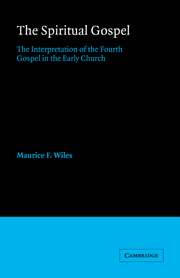Book contents
- Frontmatter
- Contents
- ACKNOWLEDGEMENTS
- ABBREVIATIONS
- INTRODUCTION Commentaries and commentators
- I The authorship and purpose of the Gospel
- II The Fourth Gospel and the Synoptic Gospels
- III Historicity and symbolism
- IV The signs
- V Leading ideas of the Gospel
- VI The Fourth Gospel and the Gnostics
- VII Christological interpretation in the third and fourth centuries
- VIII The Christological exegesis of Theodore and Cyril
- IX The Gospel of salvation
- EPILOGUE An assessment
- BIBLIOGRAPHY
- INDEX OF PROPER NAMES
- INDEX OF TEXTS
I - The authorship and purpose of the Gospel
Published online by Cambridge University Press: 06 March 2010
- Frontmatter
- Contents
- ACKNOWLEDGEMENTS
- ABBREVIATIONS
- INTRODUCTION Commentaries and commentators
- I The authorship and purpose of the Gospel
- II The Fourth Gospel and the Synoptic Gospels
- III Historicity and symbolism
- IV The signs
- V Leading ideas of the Gospel
- VI The Fourth Gospel and the Gnostics
- VII Christological interpretation in the third and fourth centuries
- VIII The Christological exegesis of Theodore and Cyril
- IX The Gospel of salvation
- EPILOGUE An assessment
- BIBLIOGRAPHY
- INDEX OF PROPER NAMES
- INDEX OF TEXTS
Summary
Towards the close of the second century, there appears considerable and widespread testimony to the Johannine authorship of the Gospel. Theophilus of Antioch quotes the opening phrases of the prologue as the words of John, one of the inspired men. He does not explicitly say that the John was the disciple of the Lord, though that may well have been his intention. Ptolemaeus, whose exposition of the prologue is quoted by Irenaeus, expressly attributes it to ‘John, the disciple of the Lord’. Heracleon also believed the Gospel on which he was commenting to be the work of a disciple. In fact the considerable Gnostic interest in the Gospel was probably motivated at least in part by the desire to find in it apostolic authority for their teaching.
In addition we have four fuller accounts of the writing of the Gospel. The anti-Marcionite prologue describes the Gospel as dictated by John to his disciple Papias ‘while still in the body’. This presumably implies that it had something of the character of a last will and testament of the aged disciple.
The Muratorian Canon ascribes the writing of the Gospel to the disciple John at the encouragement of his fellow-disciples and bishops. The Gospel is said to incorporate not only the recollections of John but of all the apostles. The writing down was the work of John and the Gospel was, therefore, published under his name.
- Type
- Chapter
- Information
- The Spiritual GospelThe Interpretation of the Fourth Gospel in the Early Church, pp. 7 - 12Publisher: Cambridge University PressPrint publication year: 1960



